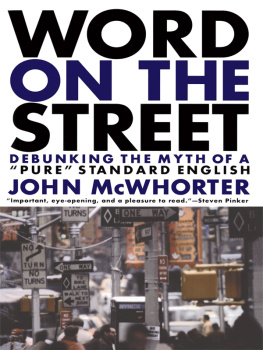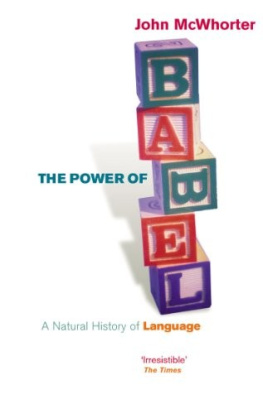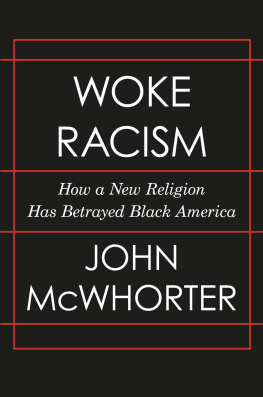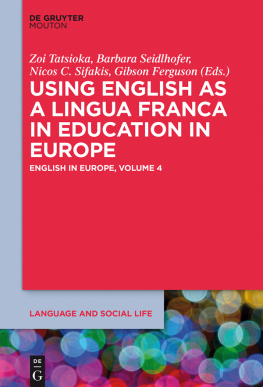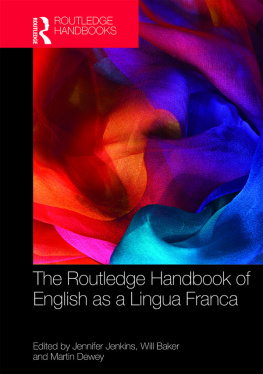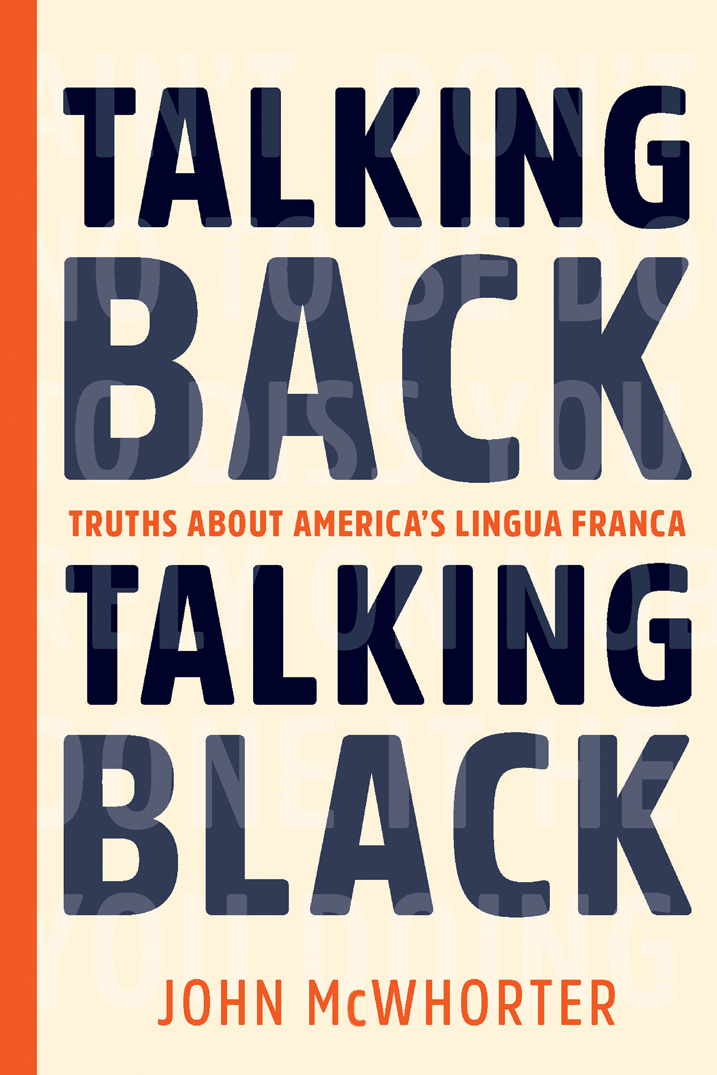

First published in the United States in 2017 by Bellevue Literary Press, New York
For information, contact:
Bellevue Literary Press
NYU School of Medicine
550 First Avenue
OBV A612
New York, NY 10016
2017 by John McWhorter
Library of Congress Cataloging-in-Publication Data is available from the publisher upon request
All rights reserved. No part of this publication may be reproduced or transmitted in any form or by any means, electronic or mechanical, including photocopy, recording, or any information storage and retrieval system now known or to be invented, without permission in writing from the publisher, except by a reviewer who wishes to quote brief passages in connection with a print, online, or broadcast review.
Bellevue Literary Press would like to thank all its generous donorsindividuals and foundationsfor their support.

This publication is made possible by the New York State Council on the Arts with the support of Governor Andrew Cuomo and the New York State Legislature.

This project is supported in part by an award from the National Endowment for the Arts.
Book design and composition by Mulberry Tree Press, Inc.
First Edition
1 3 5 7 9 8 6 4 2
ebook ISBN: 978-1-942658-21-4
For Vanessa Hamilton McWhorter, who came into this
world, born reflective, while I was writing this book.
I hope that she will read this as soon as she is
old enough to take it in, to make sure she never for a second
thinks black peoples speech is full of mistakes.
And for my cousin Octavia Thompson,
who speaks what I think of as the perfect Black English,
which I dare anybody to diss.
Table of Contents
Guide
Contents

I N HAITI, THE LANGUAGE OF PRINT, school, and the media is French, but when speaking outside of formal settings, people use another form of speech: Haitian Creole.
In Sicily, the language of print, school, and the media is standard Italian, but when speaking outside of formal settings, many people use another form of speech: Sicilian.
In Switzerland, the language of print, school, and the media is High German, but for German speakers in that country, outside of formal settings they use something other than High German: Swiss German, which is quite different in sound, vocabulary, and structure from the German one learns from a book.
In the United States, the language of print, school and the media is Standard English, but when speaking outside of formal settings, black American people use... a lot of slang and bad grammar.
At least that is the general American take on the matter. However, comparing the situation here with that in other nations, it becomes clear that we may be missing something. Why would it be that in so many places, casual language is an alternative to the standard one, treated as perfectly normal, while here in the United States, the casual speech of millions of people is thought of as a degradation of the standard form, rather than simply something different?
Certainly, racism is part of the answer. However, black Americans themselves lack the clear conception of their speech as an alternate form of language that Haitians, Jamaicans, and Swiss Germans have. They, as well as whites, tend to be perplexed at the notion of themselves as speaking Black English in the way that a Haitian speaks something in addition to French, or a Germanophone Swiss speaks something in addition to High German. To America as a whole, Black English is rather like ultraviolet light. Scientists (linguists, in this case) discuss it, but for almost everybody else it is an unperceived abstraction despite permeating our very existences.
THE RESULT IS DISSONANCES such as one that I experienced twenty years ago. I had the unexpected experience of being taken up for fifteen minutes of modest media notoriety. Suddenly, Americas television shows and newspapers wanted to know what I thought about, of all things, Black English. The matter was actually more specific: Oakland, Californias school board had proposed using Black English as an aid to imparting Standard English to black kids. The idea was to address black students lagging scholastic performance, with a hypothesis that part of the reason for it was that the English they encountered on the page was different from the English they spoke as a home language. I happened to be the black linguistor maybe the linguist who studied black speech varietiesclosest by, since I then was teaching at UC Berkeley.
From our vantage point today, it seems almost odd that there was a weeks-long media firestorm over whether a smallish city would be using Black English as a teaching tool. Similar proposals that had popped up in other cities over the twenty-five years before are today recalled only by those involved. It was partly that Oakland made its announcement during a slow news cycle before Christmas, and partly that this was at the dawn of the twenty-four-hour cable/Internet news era. If it had happened just a couple of years before, the whole affair would barely have registered beyond California.
However, the issue also resonated to such a degree because it entailed a judgment not only about black language but about black people. The Oakland school board was roundly disparaged as opportunistic, chasing bilingual education funds with a crackpot proposal that Black English is an African language. Jokes about Ebonics in the wake of the fracas circulate online to this day (Ebonics dictionary entry: PENISI went to da doctor and he handed me a cup and said penis [pee in this]). Many wondered why black people were supposed to be exempt from leaving the speech of the ghetto behind the way other immigrant groups have done, and saw the whole Oakland proposal as a kind of unreasoning identity politics.
FOR MOST LINGUISTS AND EDUCATORS involved in this saga or observing it, the racist element in all this vitriol and japery was what they carried away. The assumption was, therefore, that the academics responsibility in commentary on the issue was to focus on calling attention to the role of racism in how people feel about Black English. That assumption was considered so unassailable that I actually found myself deemed un-PC on the issue by other linguists and educators specializing in Black English, for arguing that the reason black kids have trouble in school is not Black English but the quality of the schools themselves, as well as the problems that life in disadvantaged communities can saddle students with. Yes, indeed: That was considered a disloyal position for a linguist to take.
There was, in fact, something beyond societal inequality that motivated my position, however. Racism is hardly the only thing standing between how linguists see Black English and how the public sees it. What most struck me in 1996, and what I carried away from the whole business, was that Americablack as well as whitehad no idea that there was even a Black English worthy of discussion.


